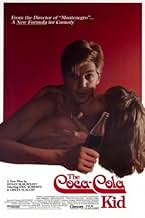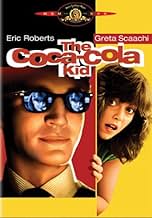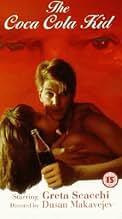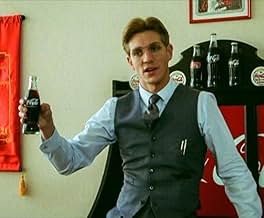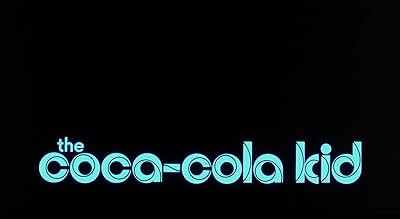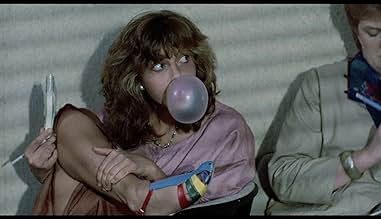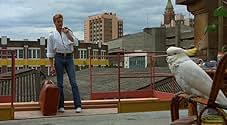CALIFICACIÓN DE IMDb
5.9/10
3.7 k
TU CALIFICACIÓN
Becker, antiguo infante de marina convertido en gurú del marketing de Coca-Cola, tiene la misión de aumentar las ventas en Australia cuando descubre un lugar seco en el Outback, donde todo e... Leer todoBecker, antiguo infante de marina convertido en gurú del marketing de Coca-Cola, tiene la misión de aumentar las ventas en Australia cuando descubre un lugar seco en el Outback, donde todo el mundo bebe cerveza, y ni una gota de Coca-Cola.Becker, antiguo infante de marina convertido en gurú del marketing de Coca-Cola, tiene la misión de aumentar las ventas en Australia cuando descubre un lugar seco en el Outback, donde todo el mundo bebe cerveza, y ni una gota de Coca-Cola.
- Dirección
- Guionistas
- Elenco
- Premios
- 8 nominaciones en total
Opiniones destacadas
Becker (Eric Roberts) is an eccentric self-possessed sales trouble-shooter sent to Australia from the Coca-Cola headquarters in Atlanta. Terri (Greta Scacchi) is assigned to be his secretary. DMZ is her daughter. He finds one specific area where there is no Coke being sold. It's Anderson valley where Terri comes from. The valley is run by the proud McDowell who makes and sells his own soft drink. He has a history with a Coke advertising girl and together they have a daughter. Becker is looking for the Australian sound.
Eric Roberts is terrific. He has a magical moment with a glass of Coke. I'm always surprised at the film's declaration that they have no connection to Coke. His presentation is like a Mamet speech about the love of Coke. Greta Scacchi is funny and super sexy as a Coca Cola Santa. The problem is that the story isn't much in between the fun scenes. Some of the music is catchy and the movie is a bit of fun.
Eric Roberts is terrific. He has a magical moment with a glass of Coke. I'm always surprised at the film's declaration that they have no connection to Coke. His presentation is like a Mamet speech about the love of Coke. Greta Scacchi is funny and super sexy as a Coca Cola Santa. The problem is that the story isn't much in between the fun scenes. Some of the music is catchy and the movie is a bit of fun.
Lots of local (Australian) colour and fun being made of corporate America. This is what we like. :-)
It's about 10 years since I last saw the film and I still sometimes finding myself humming the song, "choke back the tears when there's no Coca-Cola".
Not a great film, but another welcome Aussie comedy.
It's about 10 years since I last saw the film and I still sometimes finding myself humming the song, "choke back the tears when there's no Coca-Cola".
Not a great film, but another welcome Aussie comedy.
The film is billed as a comedy and will indeed leave you laughing at many of the situations the central characters get themselves in and out of. The movie should be viewed as a satire of the great American sales and marketing force on the global marketplace.
A hot shot marketing guru from corporate is assigned to help sales down under. He quickly finds a different pace of life and cultural values that he finds hard to adjust to. He continues on "his way" even down to the music for a new series of commercials. He knows "his way" worked well in the U.S. so it should work well anywhere.
Humorous side trips make the journey enjoyable as the guru quickly finds a large area that has no Coca Cola sales. He goes to investigate and finds a local soft drink bottler has the entire area to himself.
The guru uses every gorilla marketing trick he knows to bring the local bottler into the Coke family, but the local bottler resists and even offers Coke a deal. Coke invades the local's territory and the local realizes he cannot win against the Coke attack.
Coke's decisive win costs the company the guru as he finally begins to understand that other things in life, emotions and cultural values, are more important than business wins.
I enjoyed the film and recommend it to you, especially if you want to see a funny version of the 60's novel "The Ugly American."
A hot shot marketing guru from corporate is assigned to help sales down under. He quickly finds a different pace of life and cultural values that he finds hard to adjust to. He continues on "his way" even down to the music for a new series of commercials. He knows "his way" worked well in the U.S. so it should work well anywhere.
Humorous side trips make the journey enjoyable as the guru quickly finds a large area that has no Coca Cola sales. He goes to investigate and finds a local soft drink bottler has the entire area to himself.
The guru uses every gorilla marketing trick he knows to bring the local bottler into the Coke family, but the local bottler resists and even offers Coke a deal. Coke invades the local's territory and the local realizes he cannot win against the Coke attack.
Coke's decisive win costs the company the guru as he finally begins to understand that other things in life, emotions and cultural values, are more important than business wins.
I enjoyed the film and recommend it to you, especially if you want to see a funny version of the 60's novel "The Ugly American."
Makavejev's recipe for finally making some money. And it works! This is in the same time his worst and most famous movie. The stupid Hollywood comedy part and casting attracts random public and secures watchability for everyone, and the other art part was fun to make in his own surrealist style and observe the reactions, including the one from the coca cola company. How did a Serbian avanguard director get to organize such a team and set (action star Eric Roberts as an American marketing guru sent to Australia) remains a funny mystery to me. Every Makavejev movie is completely different so even here it was hard to imagine where will the movie go, this is the first one that made me laugh. Eric is actually very good, Greta Scacchi even better(!), and i also liked the guy with pipe, all the acting is decent, but i think the real star is the little girl (Rebecca Smart), she's just brilliant. So this is basically a crossroad: if you liked the part that made "no" sense google Makavejev, otherwise keep with Eric Roberts.
The opening titles for The Coca-Cola Kid make it clear that the film is in no way sponsored by Coca-Cola or the Coca-Cola bottling company. Obviously the company felt comfortable enough with the final product to let the film use their name, but it's hardly a glowing picture of the soft drink giant. In The Coca-Cola Kid, Coca-Cola is the face of American Imperialism. When company trouble shooter Becker (Eric Roberts) declares, "The world will not be truly free until Coke is available everywhere," he's speaking without irony. This film, then, is about Becker's attempts to help Coca-Cola colonize Australia, but what starts off as a film of comic promise and originality becomes bogged down in convention and cliché to the point that it's difficult by the final reel to remember what was so appealing at the beginning.
The Coca-Cola Kid fits nicely in the genre of American Corporate Fish Out Of Water tales. If you've seen the delightful Local Hero, for example, you'll know that no matter what kind of tough American goes off to the rural wasteland, he'll change, enlightened by the small town quirks and wisdom he was meant to subvert. That's not really giving anything away in this film, because the last act doesn't play out as you expect. In fact, it hardly plays out at all.
Becker arrives in Australia to help boost lagging sales. It turns out that there's a whole region of the country where no Coke is sold at all. Becker, a former marine with the proverbial "unorthodox way of doing business," discovers that that region is ruled over by T. George McDowell (Bill Kerr) a gruff man of homespun wisdom, but more importantly, homemade soft drinks, made from real fruit. Even though their first encounter is rough, Becker is determined to fight off the advances of his secretary-with-a-secret (Greta Scacchi) and the hotel waiter who mistakes him for an arms dealer to do the job he was sent to do.
Directed by Dusan Makavejev, The Coca-Cola Kid develops a wonderful momentum early on. In fact, the first hour of the film is an absolute gem. Eric Roberts's performance to that point is perfect. His presentation to the bemused Coke officials is comic gold, as he waxes poetic about the fizzy beverage, even holding it up to the light bathing the room in its brown glow. Roberts's early scenes with Scacchi have a nice screwball touch and his interactions with Scacchi's moppet daughter provide a nice depth for the character, hinting at something beyond his intensity. There's a nifty sequence where Becker enlists a studio band to try to come up with the "sound of Australia" where they go through several absurd suggestions before coming up with a truly catchy jingle.
I'm not sure how far it is into the movie, but for me things begin to go south immediately after that recording session. For reasons completely unclear to me, the secretary has Becker invited to a party to catch him in an awkward position. This involves completely random intimations of homosexuality and ends of feeling both forced and pointless. The scene is so clumsy that it leaves a bad taste that begins to spread.
It rapidly becomes clear that The Coca-Cola Kid isn't going to omit a single convention of Australian culture. You want an old bushman with a diggerydoo (inevitably misspelled, but my dictionary is letting me down)? You've got it. An adorable wounded Kangaroo? Bingo! And a slightly inbred man singing a rousing chorus of "Walzing Matilda?" Yup-Yup. In fact, the vision of Australia put forth by the film is so cookie-cutter that it's hard to feel bad about the culture being overrun by American interests. You support Coke because you figure they're at least putting forth a good product.
Eric Roberts's performance finally ends up being a little infuriating because he's not given any opportunity or reason to be anything other than amusingly scary. The film falls apart at just the point you wish Roberts would go through the obligatory character alteration, but there's just no chance. He's stranded. Ditto Scacchi. She adorable and makes the sexiest Santa in the history of cinema, but her character's payoff is weak. Bill Kerr is excellent for the most part, but you can't help but feel that his cagey old Outback Vet is a character we've seen a thousand times.
The Coca-Cola Kid's best and most consistent feature is its cinematography by Dean Semler. The Oscar winner (for Dances With Wolves) does what the script and director can't do -- he creates the ironic counterpoint between the Outback, the big city, and Eric Roberts. The film has a dynamic look which, unlike the narrative, doesn't fall apart at the end.
I do feel bad about only giving this movie a 6/10, but I guess I should have just turned it off early. Off to drink a Coke...
The Coca-Cola Kid fits nicely in the genre of American Corporate Fish Out Of Water tales. If you've seen the delightful Local Hero, for example, you'll know that no matter what kind of tough American goes off to the rural wasteland, he'll change, enlightened by the small town quirks and wisdom he was meant to subvert. That's not really giving anything away in this film, because the last act doesn't play out as you expect. In fact, it hardly plays out at all.
Becker arrives in Australia to help boost lagging sales. It turns out that there's a whole region of the country where no Coke is sold at all. Becker, a former marine with the proverbial "unorthodox way of doing business," discovers that that region is ruled over by T. George McDowell (Bill Kerr) a gruff man of homespun wisdom, but more importantly, homemade soft drinks, made from real fruit. Even though their first encounter is rough, Becker is determined to fight off the advances of his secretary-with-a-secret (Greta Scacchi) and the hotel waiter who mistakes him for an arms dealer to do the job he was sent to do.
Directed by Dusan Makavejev, The Coca-Cola Kid develops a wonderful momentum early on. In fact, the first hour of the film is an absolute gem. Eric Roberts's performance to that point is perfect. His presentation to the bemused Coke officials is comic gold, as he waxes poetic about the fizzy beverage, even holding it up to the light bathing the room in its brown glow. Roberts's early scenes with Scacchi have a nice screwball touch and his interactions with Scacchi's moppet daughter provide a nice depth for the character, hinting at something beyond his intensity. There's a nifty sequence where Becker enlists a studio band to try to come up with the "sound of Australia" where they go through several absurd suggestions before coming up with a truly catchy jingle.
I'm not sure how far it is into the movie, but for me things begin to go south immediately after that recording session. For reasons completely unclear to me, the secretary has Becker invited to a party to catch him in an awkward position. This involves completely random intimations of homosexuality and ends of feeling both forced and pointless. The scene is so clumsy that it leaves a bad taste that begins to spread.
It rapidly becomes clear that The Coca-Cola Kid isn't going to omit a single convention of Australian culture. You want an old bushman with a diggerydoo (inevitably misspelled, but my dictionary is letting me down)? You've got it. An adorable wounded Kangaroo? Bingo! And a slightly inbred man singing a rousing chorus of "Walzing Matilda?" Yup-Yup. In fact, the vision of Australia put forth by the film is so cookie-cutter that it's hard to feel bad about the culture being overrun by American interests. You support Coke because you figure they're at least putting forth a good product.
Eric Roberts's performance finally ends up being a little infuriating because he's not given any opportunity or reason to be anything other than amusingly scary. The film falls apart at just the point you wish Roberts would go through the obligatory character alteration, but there's just no chance. He's stranded. Ditto Scacchi. She adorable and makes the sexiest Santa in the history of cinema, but her character's payoff is weak. Bill Kerr is excellent for the most part, but you can't help but feel that his cagey old Outback Vet is a character we've seen a thousand times.
The Coca-Cola Kid's best and most consistent feature is its cinematography by Dean Semler. The Oscar winner (for Dances With Wolves) does what the script and director can't do -- he creates the ironic counterpoint between the Outback, the big city, and Eric Roberts. The film has a dynamic look which, unlike the narrative, doesn't fall apart at the end.
I do feel bad about only giving this movie a 6/10, but I guess I should have just turned it off early. Off to drink a Coke...
¿Sabías que…?
- TriviaThis film was produced without the knowledge or consent of the international offices of the Coca-Cola Company. However, since both the company and its product were depicted so favorably in the film (as well as the film being free advertising), they took no legal action against the parties involved.
- ErroresThe room service man hands Becker a silenced revolver. With the exception of obsolete Russian Nagant M1895, revolvers are not able to be suppressed because the cylinder/barrel gap allows hot gas, and therefore sound, to escape.
- Créditos curiososCatering: 'Kaos' (Highly recommended by the whole cast & crew)
- Versiones alternativasThe 2002 MGM DVD fades out the music and ends the movie as the credits end, but the original film continues the end credits song "Home for My Heart" over a black screen for about 50 seconds and then fades it out.
- Bandas sonorasHome For My Heart
Composed & written by Tim Finn
Performed by Tim Finn, Phil Manzanera, Alan Spenner, Charlie Morgan & Guy Fletcher
Produced by Phil Manzanera, Cup/Enz Productions
With the permission of CBS/Mushroom Records, Mushroom Music & Enz Music
Selecciones populares
Inicia sesión para calificar y agrega a la lista de videos para obtener recomendaciones personalizadas
- How long is The Coca-Cola Kid?Con tecnología de Alexa
Detalles
- Fecha de lanzamiento
- País de origen
- Idioma
- También se conoce como
- Coca Cola Kid
- Locaciones de filmación
- Productoras
- Ver más créditos de la compañía en IMDbPro
Taquilla
- Total a nivel mundial
- USD 93
- Tiempo de ejecución1 hora 38 minutos
- Mezcla de sonido
- Relación de aspecto
- 1.85 : 1
Contribuir a esta página
Sugiere una edición o agrega el contenido que falta

Principales brechas de datos
By what name was The Coca-Cola Kid (1985) officially released in India in English?
Responda

